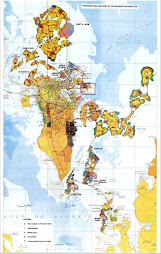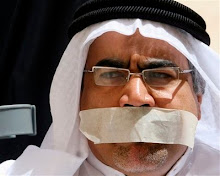Sunni side up
Bahrain's ruling dynasty fears a US attack on Iran could inflame tensions with the country's restive Shia majority, reports Ian Black from Manama Friday November 2, 2007
Guardian Unlimited
It is late morning in the Bahraini parliament and deputies are debating the small print of a law on reciprocal employment rights with other Gulf countries. Sheikh Ali Salman, the leader of the Islamist opposition group al-Wifaq, is making a point in elegant, classical Arabic - his white dishdasha and matching turban magnified onto a giant video screen. Shortly afterwards, the Speaker calls a break - just time for a quick fruit juice or noon prayers on thick Persian carpets.
This everyday scene in Manama is unremarkable, but it is evidence of a smoothly functioning - if limited - parliamentary system in one of the most fragile regions on earth. And with a crisis looming over the nuclear ambitions of its Iranian neighbour, Bahrain's uncomfortable position on the great fault line of the Muslim world is being keenly felt. The split is clear just from gazing down at the chamber from the visitors' gallery. Sheikh Salman and colleagues are immediately recognisable as Shia Muslims. A couple of them in black turbans are sayyids - senior religious scholars. Some are in western suits. Other MPs wear Sunni headdresses over their robes.
The official emphasis is on Bahrain as a nation. "We are Bahrainis first, opposition or not," insists the Crown Prince, the American-educated Sheikh Salman Al Khalifa."It's dangerous to think of things here in terms of Sunni and Shia," warns police brigadier Tareq bin Dina. It may be undiplomatic for a visitor to dwell on what are dismissed as "sectarian" issues, but it is impossible to avoid them."Everyone here knows who is from which community," volunteered Hashim, a young man whose ID card (middle names - Hussein and Ali) give away his Shia faith.Black flags strung between the minarets of mosques in a town south of Manama echo the Shia centres of Najaf in Iraq, Qom in Iran and the southern suburbs of the Lebanese capital Beirut.
Bahraini Shia homes often display pictures of Ayatollah Khomeini or Iran's current supreme leader, Ayatollah Khamenei - religious icons as well as political leaders.Statistics are hard to come by (probably deliberately) but estimates suggest Shia Muslims form two-thirds of Bahrain's population of 750,000 (a figure itself open to question).Shia political groups boycotted the election in 2002 but al-Wifaq ("Accord") changed tack last year to take 17 out of 40 seats in the house of representatives (an upper chamber is appointed by the king) despite crude gerrymandering that made it far easier for Sunnis to win.King Hamad is widely praised for the reforms of the last five years, but the political climate - the "war on terror", the invasion of Iraq, Israel's war with Hizbullah - has been tough.
"His Majesty made these decisions before George Bush brought his cowboy democracy to this part of the world," sneers Anwar Abdel-Rahman, the outspoken editor of the pro-government daily Akhbar al-Khalij.Bahraini Sunnis like Mr Abdel-Rahman watched with alarm as the "Shia crescent" snaked its way across their small island - the size of Singapore - bringing mass demonstrations onto the streets in solidarity with the embattled Shias of Iraq and Lebanon, reinforcing old communal prejudices.Signs of nervousness are clear in a murky story of the naturalisation granted to an unknown number of non-Bahraini Sunnis - as many as 40,000 according to al-Wifaq.
Judicial gagging orders prevent discussion but this is a highly charged issue. The government says it is about importing skills, while critics complain the goal is to alter the demographics to boost Sunni dominance.Evidence of discrimination is rife. Shias cannot serve in the armed forces and few occupy senior official positions elsewhere. Recently Shias have found they cannot buy land in Sunni areas."There is a tendency in the establishment to make sure Sunnis stay on top and keep the Shias down and out of sight," says one foreign observer.
There is gossip about divisions within the Al Khalifa dynasty, with the crown prince constrained by conservative figures who have the ear of his father. They are influenced by the Saudis, who brook no nonsense from their own Shia minority in the oil-rich eastern provinces across the causeway from Bahrain.Still, the government is wise to modern ways of branding strategies, marketing and slick PR. (I was one of a group of journalists invited to visit Manama on an official trip this week.) And it does have a good story to tell about being the Middle East's freest economy.Bahrain's oil reserves, small compared to its neighbours, are running out, though record high prices are still helping fill state coffers.Diversification is well advanced and the financial services industry is the main source of revenue. Growth is a healthy 7%, though efforts to reduce dependence on expatriate labour have been halting.Worryingly, though, suggest both Bahrainis and foreigners, there is sense that the political part of the reform process has ground to a halt.
Al-Wifaq acts like a loyal opposition but it urgently needs progress that can justify taking part in the next election. "We are under extreme pressure," says MP Khalil al-Marzooq.Iran looms large on the horizon, but although there is talk of Iranian support for Shia activists there is no proof of it, let alone of the sinister "sleeper cells" run by Hizbullah or the Revolutionary Guards.These, in theory, would be activated throughout the Gulf if the US or Israel attacked Iran.
"The Bahrainis have no evidence, but I think they believe it," says a western diplomat."Iranian influence has been exaggerated beyond all imagination and that helps justify repressive measures," argues Mansour al-Jamri, a former exile and now editor of the opposition paper al-Wasat.
Historic mistrust of Iran deepened when President Ahmadinejad came to power and there was a major upset this summer when the editor of the Iranian Kayhan newspaper (close to the Tehran regime) called Bahrain part of Iran - an echo of Saddam Hussein's claim on Kuwait."That," says the foreign minister, Sheikh Khaled, "was very disturbing."Bahrain, home to the US 5th fleet, is likely to be a target for retaliation, like Qatar next door with two big American airbases, if President Bush decides to hit Iran's nuclear facilities. One of them, Bushehr, is directly across the Gulf."If a war starts anything can happen," Sheikh Khaled cautions. "Iran is led by a Muslim Shia theocracy.
It is difficult to see it under attack and Shias in Bahrain keeping quiet. A conflict between Iran and the world in this region will be catastrophic. We do not want to wake up one day and see skies black and hear sirens blaring. We are much closer to Iran than Washington is."The opposition agrees. "War could cause more than physical destruction," warns the al-Wifaq MP Jasim Ali. "An attack on Iran will be seen in Bahrain as an attack on the Shia establishment. The sectarian divide will grow. If there is a war then everything else will stop. It'll be security first - and nothing else."
Email: ian.black@guardian.co.uk
skip to main |
skip to sidebar

خارطة البحرين الجديدة
Facebook Badge
Followers
فسيلة السنكيس
متى ما ظهرت الفسيلة - الصغير من النخل- من فوق سطح الأرض، فمن حقها أن تنمو وان تعانق السماء دون حصار أو مضايقة أو استهداف
حق الفسيلة في الحياة كحق غيرها، من المخلوقات، خاصة وإن كانت دليل أصالة شعب كشعب البحرين
--------------------------------------------------------------
صاحب المدونة: د.عبدالجليل السنكيس
ناشط، كاتب وباحث أكاديمي من البحرين
البريد الإلكتروني: asingace@gmail.com
مدونة اخرى: http://alsingace.katib.org/
هاتف:8179-3966-973+
حق الفسيلة في الحياة كحق غيرها، من المخلوقات، خاصة وإن كانت دليل أصالة شعب كشعب البحرين
--------------------------------------------------------------
صاحب المدونة: د.عبدالجليل السنكيس
ناشط، كاتب وباحث أكاديمي من البحرين
البريد الإلكتروني: asingace@gmail.com
مدونة اخرى: http://alsingace.katib.org/
هاتف:8179-3966-973+
مواقع ووصلات ذات صلة Links of Interest
صور معبرة

خارطة البحرين الجديدة






